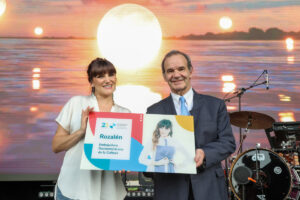TRIBUNE
Rodrigo Savazoni
Director at Instituto del Procomún in Santos, Brasil
SERIES: Towards #LABICCO n.5
The scene occurs on the outskirts of a large city in northeastern Brazil.
The protagonists are a musician, a DJ to be more precise, who is engaged in producing mixes of Brazilian popular culture compositions, and a maestro of maracatu, a drum-based artistic gender that has arisen from the mestizo union of European whites and African blacks.
– “Maestro, I want to make music of my own using your music,” the DJ says.
– “Well, do it, after all, my music is yours and everyone else’s,” the maestro replies.
– “But you have to transfer the rights to me so that I can change it.”
– “No, I can’t do that, since this music doesn’t even belong to me. It has always belonged to our people and that is why it is yours as well so that you can do with it what you wish. You only have to guarantee that it will continue to be free and that its message will reach more and more people.”
This short tale, which is not totally fictional, helps us to realise that Latin American cultural diversity is still alive and intact on account of the notion of intellectual property, which was created in the 19th century and prevailed in the 20th. This diversity, a reflection of collective intelligence and creativity, is an enormous source of values, dreams, ideas, wishes and possibilities. A heritage that belongs to everyone and to no one. A true commons. It should be valued and preserved, but, above all, it can be regarded as input for generating social innovation processes.
The Civic Innovation Laboratory (LABIC), which took place in Mexico and in Brazil and which this year will be held in Cartagena, Colombia, stands out on account of its promotion of projects geared towards strengthening the traditional and popular knowledge of the peoples that form part of us. We can say that it is a unique case, where innovation ceases to be a synonym of magnificent artefacts and interfaces produced in the centre of capitalism, to ratify its position as a series of methodologies, instruments and platforms that combine traditional and contemporary wisdoms in the quest to generate suitable answers to our societies’ challenges.
LABIC’s main concern is not to change the production system in order to guarantee the growth of productivity or to fast-track our economies, but to experiment on how we can improve our lives in the light of the challenges we are offered by today’s world.
LABIC’s main concern is not to change the production system in order to guarantee the growth of productivity or to fast-track our economies, but to experiment on how we can improve our lives in the light of the challenges we are offered by today’s world. On looking at the list of projects selected over the past three years, with good reason we will see initiatives by people of African descent, by indigenous communities, on the fight for gender equality, on the inclusion of the disabled; stakeholders who, unfortunately, do not appear at the most popular technology events.
At LABIC, culture, above all cultural diversity, is regarded as the core aspect of a new development project, which values the emotional, spiritual, ethical and aesthetic dimensions of our countries’ men and women. In the end, what knowledge can teach us better land and water management techniques so that we can feed ourselves and quench our thirst? Who are the bearers of methods that guarantee a friendly relationship with nature and can make an ode to respect and not a tale of destruction out of our history? Who are the creators of caregiving instruments that will enable us to dream of more horizontal social interaction processes among human beings, regardless of race, colour or creed?
In an interview with Fernando Sorrentino, Borges said, “It is a mistake to suppose that popular stories, because they are anonymous, have not been created (…) We can say that a popular story is a creation that has been worked on much more than a poem by Donne or Góngora, because instead of being created by one person, it was created by hundreds”. Borges’ rationale can also be applied to popular rhythms, such as the ownerless maracatu, which frees our bodies, and to civic technologies, a way of combining knowledge and generating collective works that produce real benefits so that we can all live better. It is this type of technology we seek at LABIC.
* to be read listening to Maracatu Indiano (Allah) by DJ Tudo and his people from everywhere (https://soundcloud.com/djtudo/08-maracatu-indiano-allah)
**LABICCO is the 3rd edition of LABIC (previous were LABICMX and LABICBR), and this year will be organized by the Civic Innovation Project of SEGIB in joint with the Ministry of Culture of Colombia, in partnership with Medialab-Prado, AECID, Ford Foundation and Fundación Unidos en Red. To find out more about LABICCO and the 11 proposals, click HERE
See related topics

